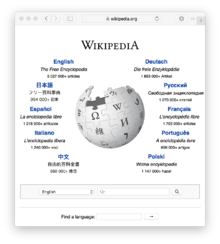Words and data to look for
For some years now, voluntary writers make the effort to provide enough serious information for all people to find for free on the net.
We have hardback copies and a subscription to Encyclopedia Britannica and provide links to it on our articles so that people also can find more information on subjects. Some of our writers also contribute to articles on the multilingual free online encyclopedia (or encyclopaedia) Wikipedia, started in 2001, to which our readers also can find additional links. It is a fantastic enterprise, that operates under an open-source management style and allows everyone to find sufficient background information on multiple topics.
Nupedia, the beginning of a free online English-language encyclopaedia

Screenshot from the Wayback Machine Nupedia 2003

Homepage of Wikipedia, which runs on MediaWiki, one of the most popular wiki software packages
Perhaps inspired by objectivist “openness,” Jimmy Wales, a successful bond trader, founded a free online English-language encyclopaedia called Nupedia, which sought free contributions from scholars and other experts and subjected them to an intensive peer-review process. Frustrated by the slow progress of this project, Wales and Nupedia’s editor in chief, Larry Sanger, in 2001 turned to a new technology, a type of software called wiki, created by American computer programmer Ward Cunningham, to create Wikipedia, a companion encyclopaedia site that anyone could contribute to and edit.
Wiki software and Wikipedia
As a feature of Nupedia.com Wikipedia entered the world of the internet on January 15, 2001, but, following objections from the advisory board, got relaunched as an independent Web site a few days later. The Wiki engines allowed content to be written using a simplified markup language, sometimes edited with the help of a rich-text editor. Ward Cunningham, the developer of the first wiki software, WikiWikiWeb, originally described wiki as
“the simplest online database that could possibly work”
It was incredible to see how many enthusiastic writers from all over the world could bring some 20,000 articles in 18 languages, including French, German, Polish, Dutch, Hebrew, Chinese, and Esperanto its first year. In 2003 Nupedia was terminated and its articles moved into the non-profit effort Wikipedia.
By 2006 the English-language version of Wikipedia had more than one million articles, and by the time of its 10th anniversary in 2011 it had surpassed 3.5 million.
The only regret we have to note is that too many readers insist that Wikipedia tells THE truth and that everything it says would really be so. They don’t realise that over the years certain writers have repeatedly taken advantage of it, to sell disinformation or totally untrue matters as well-founded. Luckily, several writer-readers are willing to invest their time to control the added articles so that individuals who will maliciously attempt to thwart the open-source website Wikipedia by introducing false or misleading content, shall be unmasked and excluded from the system. Rather than worrying about every user’s actions and intentions, proponents of wiki software rely on their community of users to edit and correct what are perceived to be errors or biases. The good thing about having continuous writers make additions and corrections is that the encyclopaedia can be kept very up-to-date. Very quickly, necessary background information can thus be delivered to the inquisitive public. Although such a system is certainly far from foolproof, wikis stand as an example of the origin of an Internet counterculture that has a basic assumption of the goodness of people.
The website’s coverage of the events of the day and controversial topics such as American politics and major events like the COVID-19 pandemic and the Russian invasion of Ukraine has received substantial media attention and has exposed weaknesses as the system’s strengths.
Wikipedia pages on female and minority scientists and engineers
It is incredible how many people use Wikipedia and trust it for its information. But one must realise that it is not an all-explanatory work that also does not reflect all information correctly balanced all the time.

Jessica Wade in 2017
Jess Wade a British physicist in the Blackett Laboratory at Imperial College London, specialising in Raman spectroscopy. noticed she could not find any information on Wikipedia about some very important people.
In 2017 after meeting American climatologist and professor Kim Cobb she wanted to know more about her and went on Wikipedia to be astonished not to find an entry on that very young but also a good professor and publisher with over 100 peer-reviewed publications in major journals.
Having the idea that Wikipedia is “used by pretty much everyone,” Wade realised that
“despite it being this incredibly important resource, it was suffering from a lack of content, particularly about women, but also about people of color.”
Since then, Wade has completed more than 1,750 pages for female and minority scientists and engineers, she often spends her evenings reading journals, scientific papers, archived documents, and social media to find potential subjects. It takes Wade a few hours to write each Wikipedia entry, but she’s not doing it all alone — she also teaches others how to research and put together pages during training workshops. Wade describes herself as a
“tiny fish in a massive sea,”
but she’ll
“keep doing everything I can to make science a more accessible and inclusive place to be.”
It is with people like her that Wikipedia is in a position to grow further into a place where people can easily go and look something up to find further more information about someone or about something.






















































